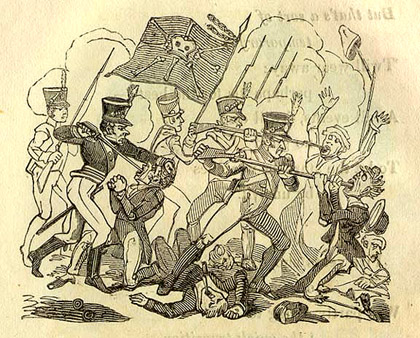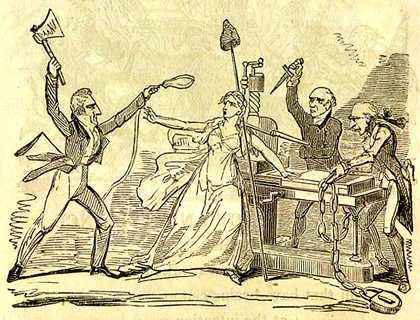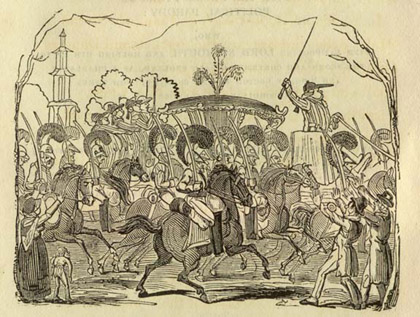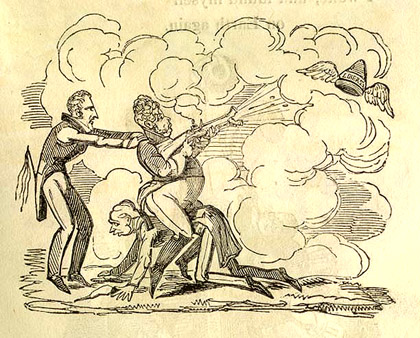The Man in the Moon, HTML transcription
[N.B.: Clicking the images will show larger, somewhat higher quality scans of the Cruikshank engravings.]
THE
MAN IN THE MOON,
A SPEECH FROM THE THRONE,
TO THE SENATE OF LUNATARIA
In the Moon.
INTRODUCTION.
THE SPEECH.
[pg5]
[pg7 - notes]

[pg9]

[pg10 - notes]

[pg11]

Notes:
Introduction, pages 1-3: Hone's narrative adopts a conventional technique for displacement by imagining that the whole story involves a kind of parallel civilization on the Moon. Of course, the displacement is utterly and intentionally transparent, as the references to contemporary London geography are entirely accurate--the references to the "brazen horse" and the Golden Cross place the spectator at the eastern corner of St. James's Park, near the King's Mews and the Golden Cross Inn. Likewise, the description of "his Royal Deyship" (the Prince Regent) is spiked with joking references to the Regent's preoccupation with "elegance" and "distinctiveness"--qualities that even Dickens would satirize in Bleak House in the character of Mr. Turveydrop.
The engraving on page one shows all the pomp and commotion of the royal procession. Presumably this is the Prince on his way to address the special session of the Senate of Lunataria. The engraving on page three offers a contrasting view: here two cabinet ministers (Sidmouth in front, Castlereagh in back) are holding up a precariously perched and bloated Prince who tries to look dignified atop two spindly rails. The passage quoted just before the engraving on page 3 comes from Alexander Pope's Eloisa and Abelard, line 124. [return]
Page 4, The Prince's Speech: The opening lines of the Regent's speech refer, of course, to the health of George III, the Prince Regent's father who had been declared insane in 1811, thus initiating the Regency period. The opening sentence from the Prince Regent's speech is "It is with great concern that I am again obliged to announce to you the continuance of his Majesty's lamented indisposition." [return]
Page 6: The page is largely self-explanatory. The Prince refers to the various government efforts to control radical activity--most prominently the practice of infiltrating radical groups with government agents or spies (indicated by the dashed names in the third line). This, of course, was a practice that the radical community detested, not only for the obvious invasion of privacy and implicit breach of trust, but also because the spies' reports were so often inaccurate. (Hence the pun on "To lie for your instruction....") Some other figures mentioned here may need identification: "Derry Down" is Lord Castlereagh, "Sid" is Lord Sidmouth, the Home Secretary, and "Van" is Lord Bexley (Nicholas Vansittart), the Chancellor of the Exchequer. [return]
Page 7, Johnny Moon Calf: Both the image and the text continue the argument from the previous page. The engraving shows two government officials—probably Castlereagh and Vansittart—piling an additional burden on "Johnny Moon Calf," the lunar equivalent of John Bull, the English common man. The Johnny Moon Calf figure is already leaning heavily on two rickety-looking crutches labeled "Credit" and "Bank Note." The point is clear enough: the fiscal policies and luxurious lives of the wealthy and powerful are putting an undue burden on the backs of ordinary English citizens. What is more, the Prince's cavalier attitude toward those who are wanting such bare necessities as food shows the pamphlet's view of an unfeeling, self-interested government in desperate need of reform. [return]
Pages 8-9, Steel Lozenges: The Prince of Lunataria sees hardships such as the want of food as a "temporary evil" that must be suffered by the lower orders, those "starving wretches." Not surprisingly the claim echoes the arguments of the English Prince Regent who contends that
Some depression still continues to exist in certain branches of our manufactures, and I deeply lament the distress which is in consequence felt by those who more immediately depend upon them; but this depression is in a great measure to be ascribed to the embarrassed situation of other countries, and I earnestly hope that it will be found to be of a temporary nature.
The Prince of Lunataria then describes (accurately enough) two important contexts. By "the quick transition / From war to peace" he alludes to the defeat of Napoleon in 1815 and the end of a prolonged and expensive war with France. While that war was ongoing, it was common for the government to refuse to hear petitions about domestic economic distress on the grounds that the national resources were engaged in a foreign war. Then, in 1816, Europe endured the so-called "year without a summer" during which widespread crop failures (the Prince's "scanty crops") caused additional hardship. "Then, something else" ... which the Prince is unable to name. The point, of course, is that there is always some external cause for the economic straits of the "lower orders." In the Prince's view, this absolves the present government from any responsibility for the economic circumstances, and it justifies the violent suppression of the Radicals who actively protest against such conditions. Such is the basis of Cruikshank's disturbing portrayal of the "STEEL LOZENGES." This vision of the Manchester Massacre has the hungry protestors' mouths filled by the swords and bayonets of military force—an act which, in a macabre parody, both gives the radicals something to eat and simultaneously cuts out their tongues/voices. [return]
Pages 9-12, The Holy Compact and Alliance: The reference here is to the so-called Holy Alliance that loosely united the rejuvenated European monarchies in the years immediately following the fall of Napoleon. (See Right Divine, Introduction, par. 3.) The text and images in this section are remarkable for suggesting a direct link between the Holy Alliance and the suppression of the press. In Hone's view, as is particularly evident in the closing lines of the Prince's speech (p. 12), the Holy Alliance was a sham of pure hypocrisy whose real intent was to silence the voices of rebellion and reform--—symbolized here by the image of the printing press accompanied with the female figure of liberty and a liberty cap--—while protecting "our morals" (i.e. the privileges of the ruling classes) from public critique. Cruikshank's second image links this effort at the suppression of the printing press--—a key provision of the "Six Acts"--—with the figures of Castlereagh (holding the axe and noose), Canning (holding the dagger), and Sidmouth (preparing the chains and padlock). [return]
Page 12: The closing image of this section of the poem refers back to the Prince's opening lines:
'Tis pity that these cursed State Affairs
Should take you from your pheasants and your hares[.]
Here the Prince, riding on the back of Sidmouth and with the support of Castlereagh, is shooting at a cap of liberty. The killing of liberty has apparently become a mere sport for the Prince. [return]
Page 13: The brief coda brings the lunar vision to a close as the narrator is jostled back to earth once again by the conflicting and chaotic shouts of loyalty, shrieks of woe, and the din of "horrid discord." The concluding image shows emblems of several royalist newspapers, the Courier (edited by T. G. Street), the Morning Post (represented by a hitching post), and The New Times—the latter labeled "slop" after Hone's appellation of John Stoddart, the chief editor of that newspaper (see Buonapartephobia) whose caricature is on the right. At the bottom, a dog is lifting a leg on an emblem of The Sun newspaper. All of these figures support the three plumes representing the Prince Regent. The plumes of this closing image thus echo against the plumes on the title page and on the Prince's carriage in the image on the first page. [return]




